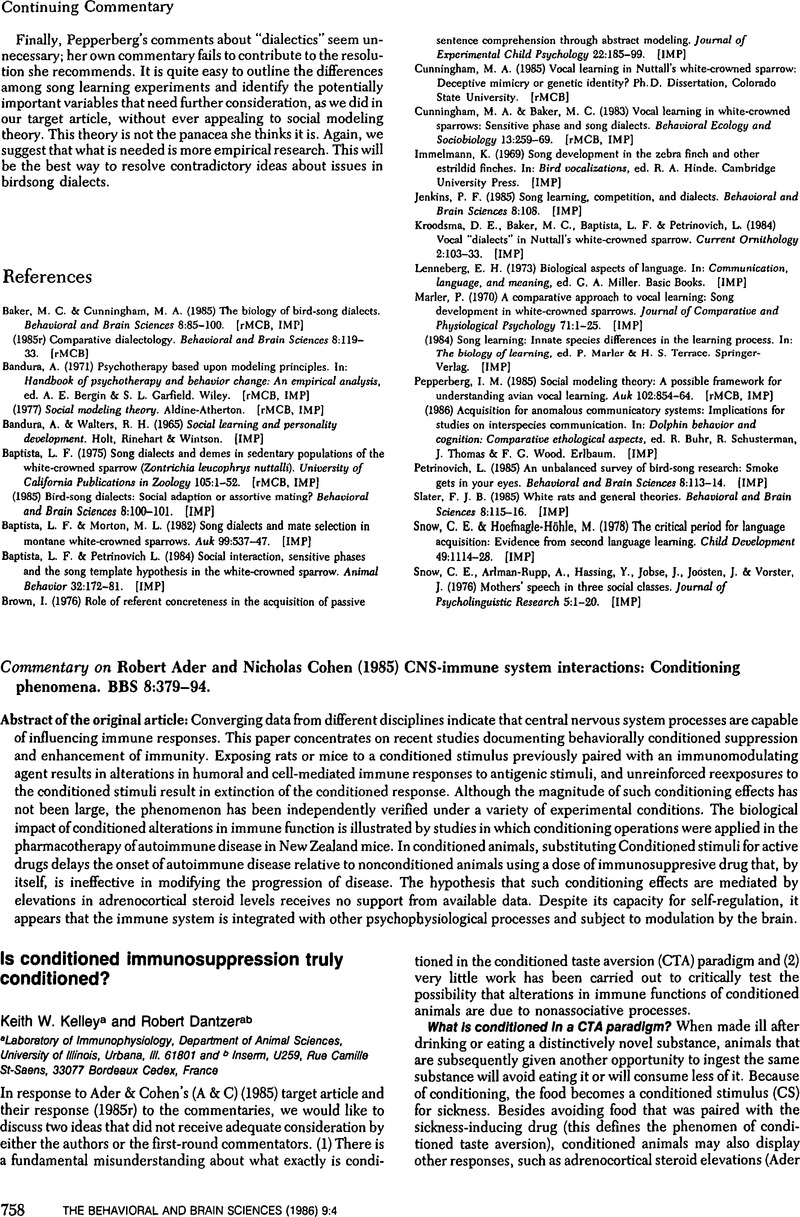Crossref Citations
This article has been cited by the following publications. This list is generated based on data provided by Crossref.
Domjan, Michael
and
Nash, Susan
1989.
Conditioning of sexual and reproductive behavior: Extending the hegemony to the propagation of species.
Behavioral and Brain Sciences,
Vol. 12,
Issue. 1,
p.
138.
Grossberg, Stephen
1989.
Classical conditioning: The role of interdisciplinary theory.
Behavioral and Brain Sciences,
Vol. 12,
Issue. 1,
p.
144.
Overmier, J. Bruce
1989.
Mis(sed)-representations.
Behavioral and Brain Sciences,
Vol. 12,
Issue. 1,
p.
156.
Krank, Marvin D.
1989.
Pavlovian conditioning: Providing a bridge between cognition and biology.
Behavioral and Brain Sciences,
Vol. 12,
Issue. 1,
p.
151.
MacQueen, Glenda
MacRae, James
and
Siegel, Shepard
1989.
Contiguity, contingency, adaptiveness, and controls.
Behavioral and Brain Sciences,
Vol. 12,
Issue. 1,
p.
154.
Kimmel, H. D.
1989.
The importance of classical conditioning.
Behavioral and Brain Sciences,
Vol. 12,
Issue. 1,
p.
148.
Locurto, Charles
1989.
The dark side of hegemony.
Behavioral and Brain Sciences,
Vol. 12,
Issue. 1,
p.
153.
Kehoe, E. James
1989.
Associative theory versus classical conditioning: Their proper relationship.
Behavioral and Brain Sciences,
Vol. 12,
Issue. 1,
p.
147.
Lloyd, Dan
1989.
Extending the “new hegemony” of classical conditioning.
Behavioral and Brain Sciences,
Vol. 12,
Issue. 1,
p.
152.
Jacobs, W. J.
1989.
What is classical conditioning?.
Behavioral and Brain Sciences,
Vol. 12,
Issue. 1,
p.
146.
Bersh, Philip J.
and
Whitehouse, Wayne G.
1989.
The domain of classical conditioning: Extensions to Pavlovian-operant interactions.
Behavioral and Brain Sciences,
Vol. 12,
Issue. 1,
p.
137.
Riley, Anthony L.
1989.
Classical conditioning: A parsimonious analysis?.
Behavioral and Brain Sciences,
Vol. 12,
Issue. 1,
p.
157.
Klosterhalfen, W.
and
Klosterhalfen, S.
1989.
Zukunftsaufgaben der psychosomatischen Medizin.
p.
135.
Kentridge, R. W.
1989.
Complexity at the organismic and neuronal levels.
Behavioral and Brain Sciences,
Vol. 12,
Issue. 1,
p.
147.
Samar, Vincent J.
and
Berent, Gerald P.
1989.
Classical conditioning and language: The old hegemony.
Behavioral and Brain Sciences,
Vol. 12,
Issue. 1,
p.
158.
Klosterhalfen, Sibylle
and
Klosterhalfen, Wolfgang
1989.
Beyond respondent conditioning.
Behavioral and Brain Sciences,
Vol. 12,
Issue. 1,
p.
149.
Turkkan, Jaylan Sheila
1989.
Classical conditioning: The new hegemony.
Behavioral and Brain Sciences,
Vol. 12,
Issue. 1,
p.
121.
Hollis, Karen L.
1989.
Preparatory response hypotheses: A muddle of causal and functional analyses.
Behavioral and Brain Sciences,
Vol. 12,
Issue. 1,
p.
145.
Fields, Chris
1989.
Explaining classical conditioning: Phenomenological unity conceals mechanistic diversity.
Behavioral and Brain Sciences,
Vol. 12,
Issue. 1,
p.
141.
Dworkin, Barry R.
1989.
Learning and functional utility.
Behavioral and Brain Sciences,
Vol. 12,
Issue. 1,
p.
139.



